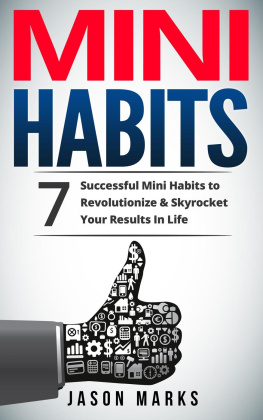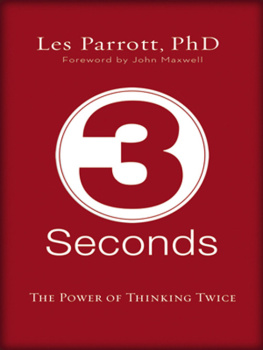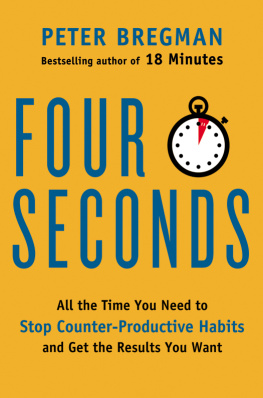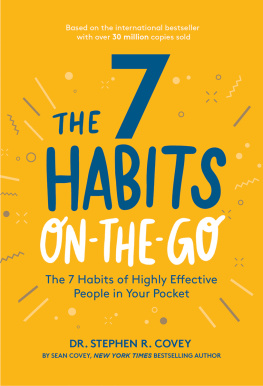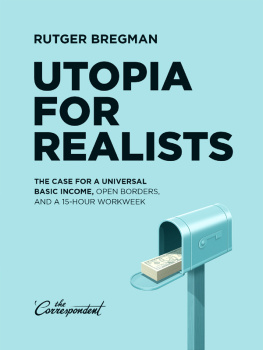
To Mama and Papa.
Thank you for loving me,
believing in me,
and supporting me.
I love you.
CONTENTS
I WAS WALKING DOWN FORTY-EIGHTH STREET IN MIDTOWN MANHATTAN, when a man, well-dressed in a nice suit and shined shoes, with coiffed hair, and a leather briefcase, brushed by me. Then I saw him turn his head and spit out his gum.
I kept my eyes on the wad of gum to be sure I didnt step on it. The gum flew maybe three feet in front of me, bounced off a tree, and then rolled onto the sidewalk, landing right underneath his foot as he took his next step. He kept walking without noticing his own bright blue gum stuck to the sole of his shoe.
I laughed out loud.
And then I got to thinking. How often do we all do the same thing? How often do we take an action that we think is in our interest but ultimately ends up as gum stuck to our shoes? How often do we engage in behaviors that backfire?
Sometimes the ways in which our actions work against our interests are blatantly obviousand easy to avoid. I just heard a story of someone who worked in a senior role at a Wall Street bank. Like the bank, he was highly leveraged; hed bought an apartment well beyond his means. When he heard he wouldnt be getting a bonus as big as hed expected, he yelled and cursed and disparaged his boss to other people in the firm. Now he doesnt have a bonus or a job.
Other times our self-sabotaging ways are more subtle, like the time I was running late for dinner with my wife, Eleanor. We had agreed to meet at a restaurant at seven oclock, and it was already half past. I felt guilty but had been stuck in a client meeting that ran over. When I arrived, I apologized and told her I didnt mean to be late.
You never mean to be late, she answered. Uh oh. She was mad.
Im sorry, sweetie, I said, but it was unavoidable. I explained why I was late, describing details about the client meeting, maybe exaggerating a little to convey to her how important, how inescapable the meeting really was.
But instead of soothing her, I only made things worse. Now she was angry and annoyed.
Which made me angry and self-righteous. Look, I said, Im working really hard.
The conversation continued to spiral down, each of us reacting to the others response. We both wanted the same thingto enjoy a nice dinner together. But our reflexive responses moved us apart, and we ended up feeling separate and angry, the exact opposite of what we intended.
The culprit: our counter-productive, knee-jerk reactions.
My knee-jerk reaction to being late was to offer an explanation. Eleanors knee-jerk reaction to my explanation was impatience. My knee-jerk reaction to Eleanors impatience was anger. And on and on the argument went, each of us mindlessly following our instinct-driven script, no matter how ineffective.
Obviously, I didnt intend to get into an argument with Eleanor. In fact, the reason I offered an explanation for my lateness was not to get into a fight. Yet, at the end of the day, my intention alone wasnt the most important thing. What mattered even more was how my actionexplaining my latenessaffected Eleanor. Pretty poorly, it turned out. I basically spit out my gum and then stepped on it.
When Bad Habits Happen to Good People
The basic things we all wantfulfilling relationships, accomplishments of which were proud, meaningful success at work, to be of service to others, peace of mindare surprisingly straightforward to achieve. But, in many cases, our best efforts to achieve them are built on habits and behaviors that, simply put, dont work.
When we feel overwhelmed and stressed by our growing to-do list, our knee-jerk reaction is to work longer hours and pack more into the hours we are already working. We multitask, dash from meeting to meeting, sneak e-mails under the conference-room table, and work early in the morning and late into the night. Our intention is to reduce our stress and overload. But our actions have the exact opposite effect: we end up more stressed and more overloaded.
Or we say things we think will impress someone but, instead, prompt rejection. We reach out to comfort a friend but, somehow, make her more upset. We give a team a pep talk, but without knowing why, we discourage them.
Each time we feel stunned. What just happened? we wonder. In the end, we spend days trying to repair the damage of those knee-jerk reactions that have backfired on us. We spend countless hours and energy thinking about what we said, talking to others about how we handled a situation, planning our next move, and maybe even walking the long way to the bathroom so we dont have to pass someone weve inadvertently offended in the hallway.
Four Seconds to a Better Habit
There is good news: this is not a hard problem to solve. In fact, all you need is four seconds. Four seconds is the amount of time required to take a single breath. That short pause is all you need to see where youre going wrong and to make a little shift.
And I mean little. The alternatives I suggest in the pages that follow are amazingly straightforward. They give you the results you want, and you wont have to spin your wheels endlessly. They are ways of thinking, speaking, and actingways of beingthat are simpler than the old ways and far more effective. They take less time and less energy. They help you become hyperproductive without being hyper.
In my book, 18 Minutes: Find Your Focus, Master Distraction, and Get the Right Things Done, I offered a way for you to regain your focus and reshape your days around what matters most to you. I asked you to be strategic and intentional about what you do.
In Four Seconds, Ill show you how to be strategic and intentionalat the speed of lightabout how you do what you do. 18 Minutes helped you focus on the right things. Four Seconds will help you get the most out of that focus.
After all, its not enough to excel at managing your time; you need to excel at using that time powerfully. How you act during those hours determines your success: how you frame your mind, how you relate to others, how you speak and act at work and with your teams. The goal is not just to survive a busy life but to thrive in your most important endeavors and relationships.
Youll learn to replace time-sucking, energy-wasting, counter-productive knee-jerk reactions with new habits and behaviors that are time saving, energy boosting, and productive. Youll learn new ways of living, working, and connecting in this fast-paced world that bring results and peace.
A New Habit Is Born
What could I have done differently when I arrived late so my valuable time with Eleanor was spent enjoyably instead of fighting? I could have taken just four secondsenough time for a deep breath, a pause, a reset of my perspectiveand then resisted the urge to explain my lateness, and instead acknowledged Eleanors experience of waiting for me:
Im sorry Im late. Youve been sitting here for thirty minutes, and thats frustrating. And I know its not the first time. I can see how it seems like I think being with a client gives me permission to be late. Thats disrespectful of your time, and Im sorry you had to wait here for so long.
This is easier said than done. My intuitive, gut-instinct, knee-jerk reaction is to validate my tardiness rather than my wifes feelings. Doing so makes me feel better, like Im not so bad for being late because theres a specific reason. But the intuitive response is counter-productive. While it makes me feel better, it makes Eleanorwhos been waiting for mefeel worse. It reinforces the point that whatever I was doing that made me late is clearly more important than she is. And just like that, without even realizing why, our nice evening is destroyed.
Next page

